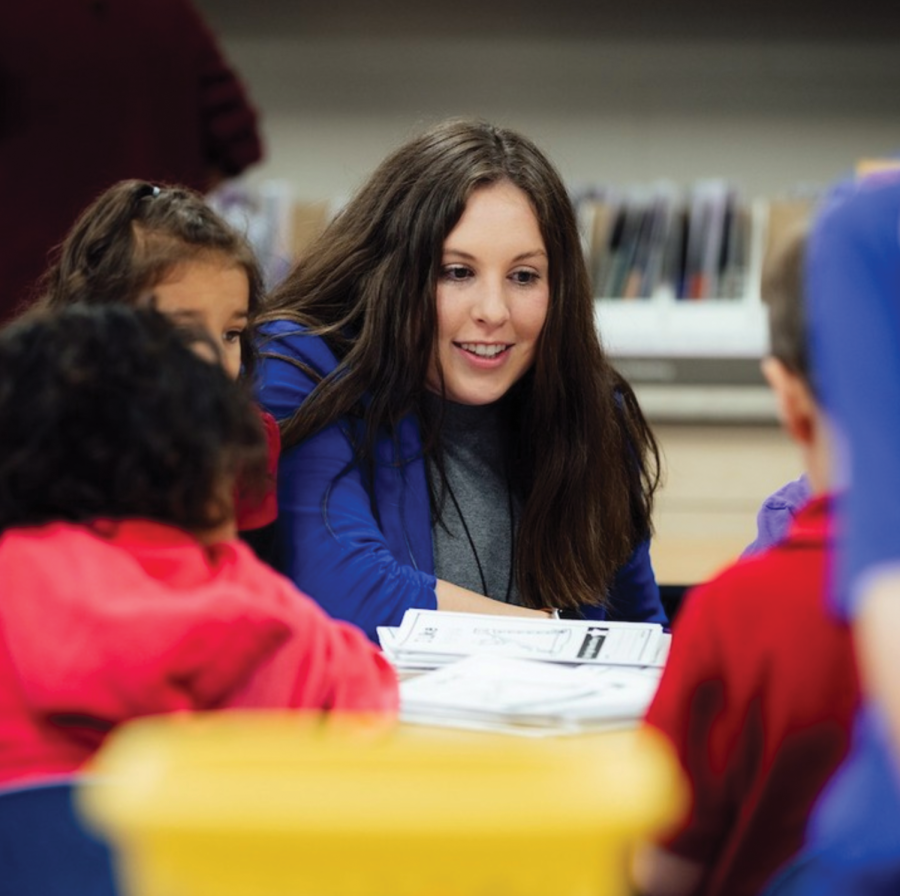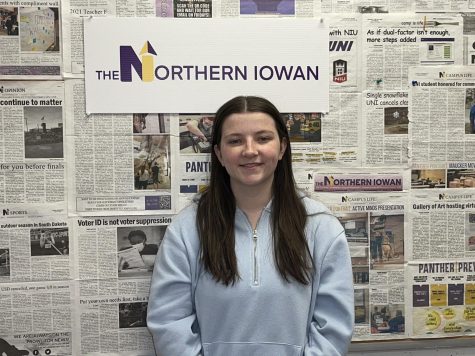Fulfilling or frightening?
Future educators size up the education field amidst recent legislation
Iowa state legislature recently passed SF 496, which increases government regulation on education through means including book bans and restrictions over discussions involving gender identity and sexual orientation. UNI students entering the education field have to take these recent changes into consideration when looking for jobs and preparing for careers in the field.
Apr 16, 2023
The University of Northern Iowa has long been regarded as one of the midwest’s top spots for future educators, boasting a 98% placement rate after graduation. UNI is also in the top 1% in the nation in number of B.A. teaching graduates, known for providing hands-on opportunities for future educators.
Iowa has also become the hotspot of controversial legislation around education, recently passing Senate File (SF) 496 in both the house and senate, which increases the number of books banned and reduces standards on health education. Iowa public school districts are no longer allowed to provide any instruction regarding gender identity and sexual orientation for kindergarten through sixth grade. Public school districts must post a list of all books in the school’s library, which will be fully accessible by the public. SF 496 also requires public schools to notify parents if a child has had a change in gender identity or plans to transition. Just last month at a school board meeting, Des Moines public school district interim Superintendent Matt Smith said, “I am actually being told by many folks that we look to recruit from outside the state, that Iowa is no longer a destination.”
The newly passed bill has been met with public contention, drawing national attention as Iowa joins a list of other states implementing more government control in public schools. At the same time, fewer students are majoring in education and the nationwide teacher shortage continues to grow. Some account this to the dwindling salaries teachers receive. While these obstacles hinder growth in the education sector, UNI’s College of Education accounts for over 2,200 or 25% of all students, making it the program with one of the highest enrollment.
Abigail Morlan is a junior studying elementary education with a strategy II instructional strategist minor who was born and raised in Cedar Falls. For her, picking UNI was an easy choice. “In my opinion, UNI is one of the best schools in the country for education,” Morlan said. She plans to stay in the Cedar Valley and teach in the Waterloo school district after graduation.
Morlan said that pursuing her career choice has not been without its obstacles. Despite the change in the educational climate, Morlan still has hope for what the future will look like. “I think currently with such a shortage and high need for educators, it has created a toxic climate in many schools. There is more negativity and more teachers are leaving the field. This is incredibly discouraging to students who are going through the education program who are so excited to teach,” she said.
“It’s also disappointing knowing how much work goes into this field, yet many teachers cannot afford to live. The pay is nowhere near enough, but I have decided to continue for the kids and because I am so passionate about education. They are future leaders and change-makers, so I want to make a positive impact and give students the tools they need to be independent and thrive,” Morlan said.
Morlan is not the only student majoring in education who thinks the education system has faults. Samuel Wadle is a math teaching major at UNI who has dreamed of pursuing a career in education since elementary school. “While I may teach math, the part of education that really draws me to the profession is the students and how educators are able to shape them. Creating a lasting impression on those kids is the most rewarding part of the job,” Wadle said.
According to Wadle, the recent legislation is harming Iowa schools. “I feel as educators, it is our responsibility to provide a safe and positive environment in which the students are able to learn. Banning and/or restricting people or things does one thing in my eyes; it takes away an opportunity to learn. These students will likely be presented with difficult or uncomfortable situations at some point in their lives and making school a space where these situations do not occur eliminates the chance we have as educators to prepare our students for what may lie ahead,” Wadle said.
Becky Hawbaker is a UNI alumni, graduating in 1991 with a history-teaching major, and later attending the University of Iowa where she earned her M.A. and Ph.D. in special education. Hawbaker is now an assistant professor in the Department of Teaching and serves as the faculty co-chair for educator preparation.
For Hawbaker, the recent action in the Iowa house and senate has changed the way she approaches conversations with UNI education students. “New legislation and the current political climate have definitely influenced how I talk to my students about their future teaching jobs. It is important for our new teachers to go in with their eyes wide open and understand that things we used to take for granted, like a general respect for teachers and respect for their content knowledge, are no longer so true,” she said.
“I tell them to really research the schools and districts they apply to teach in and to be cautious in their first few years until they have their standard license. I tell them about some of the negative experiences of some of my former students. I tell them to join their union and research their contract before they sign it,” Hawbaker said. “But I also tell them that our democracy has never needed caring, intelligent, creative, principled young teachers like them in our schools more, and that the power to transform lives through education is ultimately worth the frustrations, stress and noise.”
As Hawbaker pursued her own education, she encountered obstacles. But ultimately, her passion for teaching held constant throughout all struggles. “I completed my Ph.D. while working full time here at UNI (2008-2018) and trying to be a good mother to three wonderful daughters. The closure of Price Lab and my battle with breast cancer in 2012 were probably my biggest obstacles, and I overcame them with the support of my family, friends and colleagues. I just stayed focused on the positives and where I had the power to make change,” Hawbaker said.
Despite encountering numerous obstacles, Hawbaker has focused on improving the future of education by connecting with young students here at UNI. She is eager to make a difference in the educational system, and is using UNI as the catalyst for that movement.
“I chose to become a teacher because it was a perfect match for my love of learning, my desire to make a positive difference, and because I really enjoy working with children and youth,” Hawbaker said. “Teaching is really more of a vocation or calling than just a job, and despite, or maybe even because of all the new controversies and political pressures, I’d still choose teaching all over again.”









